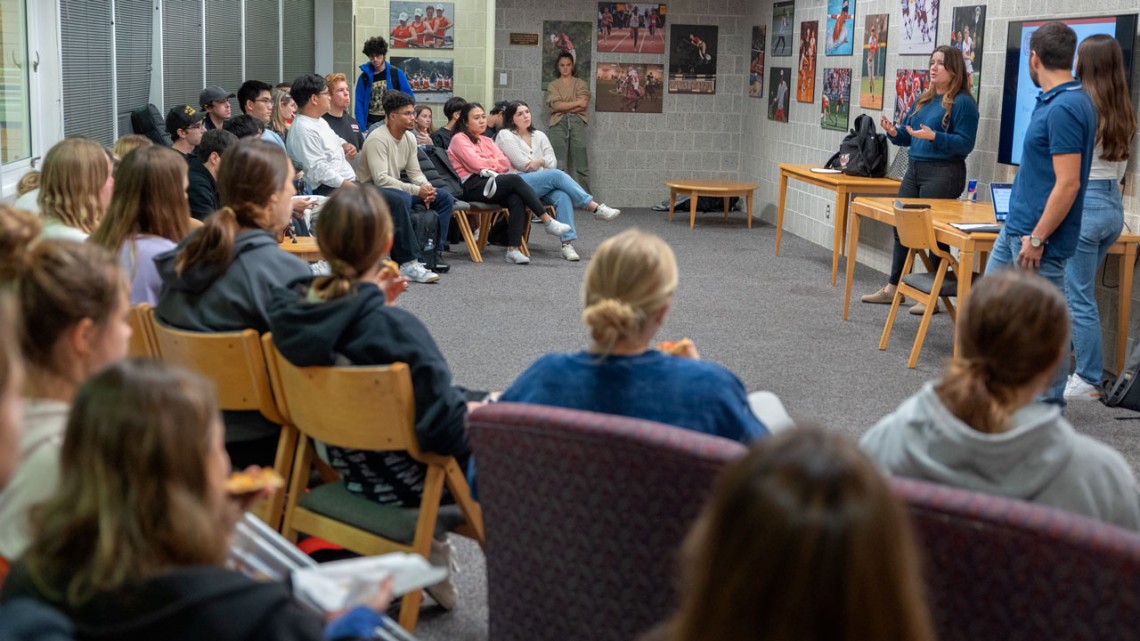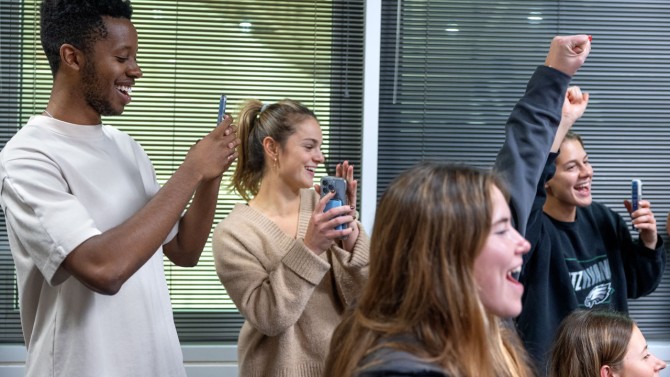
Students in a new Cornell Law School practicum run a financial literacy training for student-athletes in Bartels Hall on Oct. 26.
Peer-to-peer course improves student-athletes’ financial literacy
By Caitlin Hayes, Cornell Chronicle
At the start of her senior year, Cornell gymnast Darby Kent ’23 was about to enter the workforce but knew very little about managing her finances – how to assess a salary, create a budget, invest in retirement or file taxes.
That is, until she participated in a Cornell Law School practicum where students become the instructors and mentors for student-athletes, giving them the skills to manage their finances while in school and when they graduate. The practicum gave Kent not only life skills, but also a new passion.
“That one class opened me to a whole new world that I was convinced I wouldn’t like,” said Kent, who majored in food science in the College of Agriculture and Life Sciences. “It made me really gung-ho about financial literacy and trying to educate as many people as possible.”
The practicum, taught by former Cornell baseball player Austin Arnold ’18, M.P.S. ’19, uses peer learning to improve student-athletes’ financial literacy.
“There can be trepidation about approaching a professor to talk about financial circumstances or for practical advice,” said Arnold, adjunct professor of law in the Law School and a financial planning and analysis manager. “Being able to talk to one of your peers – it’s really a low barrier, a comforting place to air anxieties or ask questions.”
A series of seminars – newly branded this semester as the “Financial Freedom for Athletes” series – cover topics such as budgeting, taxes, investment and retirement, as well as student-athletes’ new ability to profit from their name, image and likeness (NIL), following a 2021 change in NCAA policy. The course is open to all, and seminars are designed and led by a diverse group of graduate students and undergraduates, athletes and nonathletes. Students also hold office hours, where athletes can come with questions about their particular circumstances. Reception has been overwhelmingly positive, with some sessions drawing more than 50 student-athletes.
The curriculum, created in collaboration with Cornell Athletics and John McKinley, professor of practice in the Charles H. Dyson School of Applied Economics and Management, was initially an offshoot of Cornell Law School’s Low-Income Taxpayer Law and Accounting Practicum, which provides tax services to low-income constituents across the country. Last spring, Arnold received funding from the NCAA to pilot the practicum as a standalone program, with hopes to expand the peer-learning model to other schools.
“Just the sheer number of people who participated last year is really encouraging,” said Amy Foster, Cornell’s senior deputy associate director for the student-athlete experience. “You could feel the excitement and how practical and relevant the information was to the athletes. The questions they asked in the sessions and the way the conversations continued as they were leaving – you could really sense that this was fulfilling a true need.”
Filling a gap
Arnold became aware of that need for financial literacy as an undergraduate at Cornell. He majored in applied economics and management in the Dyson School and was part of a business fraternity, Phi Chi Theta, that he said provided outstanding programming to prepare him for professional life.
But he noticed that kind of preparation wasn’t easily accessible for student-athletes.
“I had a phenomenal experience at Cornell, but I saw this gap, where that practical knowledge was not widely shared with student-athletes, who often don’t have time to participate in fraternities or other programs,” Arnold said.
Student-athletes may be particularly vulnerable to financial mismanagement; Arnold cited studies from the NCAA that found student-athletes have higher financial anxiety and more difficult financial situations overall and are also more likely to take financial risks than their nonathlete counterparts.
“Financial literacy is important for everyone,” Arnold said. “But those measures of financial anxiety, along with more reckless spending or financial habits, definitely made this a population we wanted to target.”
And the NCAA’s policy change on NIL expanded financial opportunities for student-athletes but also introduced complications.
“NIL is exciting for our student-athletes,” Foster said, “but at the same time, they were given this opportunity without necessarily having the foundation for how to manage it: what it means for their personal finances, how it might impact their financial aid or what kind of legal support they might need.”
For gymnast Amy Krueger ’23, a chemical engineering major in Cornell Engineering, the training came at just the right time – as she was about to transition from full-time student-athlete to full-time engineer with her first real source of income.
“What I learned in the sessions became relevant very quickly,” she said. “I find myself going by the rules they talked about when I’m trying to make my budget now.”
Krueger said the fact that the information came from peers was crucial. “They had to learn it themselves and turn it around in a way that they could understand it, which made it easier for us to understand,” she said. “They also made the sessions fun.”
Within the course itself, JD-MBA student Siddharth Rai ’23 said the diversity of students enrolled expanded his sense of community.
“Because of this clinic, I built relationships with people I never would have met otherwise, some of whom have become close friends,” Rai said. “It helped me feel much more connected to different parts of campus. I met people from different majors, different sports. Coming from India, I didn’t know much about college sports, but I saw how the athletes are committed to their trainings, how they structure their lives around it. It was fascinating to see that and hear their perspectives.”
Arnold is currently in talks with Ithaca College and the State University of New York at Cortland about helping them to implement the peer-learning model at their schools. He would especially like to provide guidance to institutions that may not have capacity to hire someone to run a program, he said.
“The idea is to implement a program, maybe even nationwide, that’s hands-on, peer-to-peer, low barrier to entry, and sensitive to all backgrounds,” Arnold said. “That’s the goal.”
Media Contact
Get Cornell news delivered right to your inbox.
Subscribe

